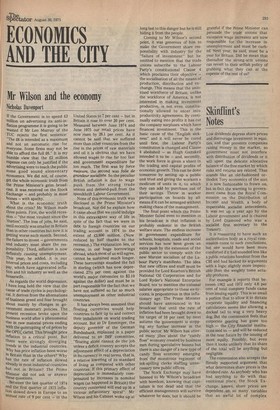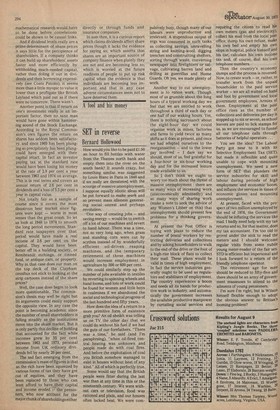Skinflint's Notes
Low dividends depress share prices and discourage investment in equities, and that prevents companies raising money in the market, so government must not interfere with distribution of dividends or it will upset the delicate allocative balance of the free market by which risks and returns are related. That sounds like an old-fashioned orthodox Tory economics of the sort it is now fashionable to frown on, but in fact the warning to government came from the Royal Commission on the Distribution of Income and Wealth, a body of impeccable socialist antecedents. It was set up a year ago by the Labour government and is chaired by Lord Diamond who was a socialist first secretary to the Treasury.
It is reassuring to have such an authoritative body as a royal commission come to such conclusions, but one would have been more comforted if it had sounded less like a public relations handout from the CBI and had backed its arguments with a logic slightly more impeccable than the weighty tome actually produces.
For example it reports that between 1962 and 1972 only 4.6 per cent of total company funds came from issuing equity. This is so small a portion that to allow it to dictate corporate liquidity and financing calculations seems like allowing a docked tail to wag a very heavy dog. But the commission feels that corporate gearing has gone too high — the City financial institutions said so — and will be reduced in the near future by the issuing of more equity. Possibly, but even then it looks unlikely that its share of the total will be anything but negligible.
The commission also accepts the flimsily supported argument that what determines share prices is the dividend rate. As anybody who has had anything to do with that emotional place, the Stock Exchange, knows, share prices are dependent on. so many variables that an awful lot of complex mathematical research would have to be done before correlations could be shown to be causal links.
And if dividend levels really are a prime determinant of share prices it says little for the percipience of shareholders. If a company thinks it can build up shareholders' assets faster and more efficiently by withholding much-needed capital, rather than doling it out in divi dends and then borrowing expensi vely (see Coats Patons), it seems more than a little myopic to value it lower than a profligate like British Leyland which paid out as if there were no tomorrow. There wasn't.
Another point is that if return on one's investment really is an im portant factor, then no sane man
would have gone within hammering sound of the Stock Exchange.
According to the Royal Commis sion's own figures the return on shares has seldom been satisfacto ry, and since 1969 has been plung ing so precipitately has been plungcould have emerged with their capital intact. In fact an investor paying tax at the standard rate would have been losing his money at the rate of 2.9 per cent a year between 1963 and 1974 on average. This is in real terms and covers an annual return of 2.6 per cent in dividends and a loss of 5.5 per cent a year in capital value.
Not totally fair as a sample of course since it covers the most disastrous bear market since fig ures were kept — worse in most senses than the great crash. So let us look at 1948 to 1974 to smooth the long period movements. Standard rate taxpayers over that period would have made a real income of 2.6 per cent on the capital. They would have been better off in a building society, or Rembrandt etchings, or tinned food, or antique cars, or property. Why in that case does our man on the top deck of the Clapham omnibus not stick to looking at the strip cartoons instead of the share prices?
Well, the case does begin to look more questionable. The commis sion's thesis may well be right but its arguments could easily support the opposite view. In any case the point is becoming academic since the number of small shareholders is falling steadily as the institutions move into the share market. But it is only partly this decline of holding that accounted for the fact while incomes grew by 35 per cent between 1963 and 1973, personal income from UK ordinary dividends fell by nearly 20 per cent.
The sad fact emerging from the commission's mass of figures is that as the rich have been squeezed by various forms of tax they have got out of equities, and they have been replaced by those who can least afford to have their capital and income eroded — the pensioners, who now account for the major chunk of shareholdings either directly or through funds and insurance companies.
In sum then, it is a curious report which claims dividends affect share prices though it lacks the evidence for saying so; which asserts that shares are an important source of company finance when plainly they are not and are becoming less so; which is worried at the future readiness of people to put up risk capital when the evidence is that individuals are becoming less important and that in any case adverse circumstances seem not to have deterred them.



































 Previous page
Previous page